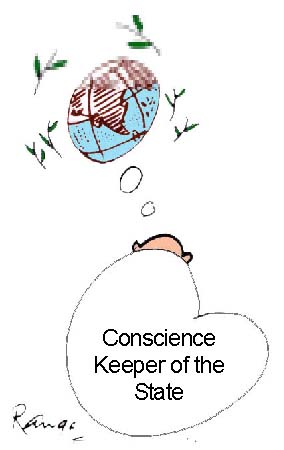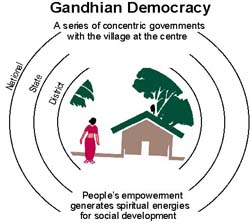|
Linking Rivers Compounding Misgovernance - An assult on rural ecology
SK Shamra After 55 years of independence, both our social fabric and the environment are under severe stress. India’s population has grown from 320 to 1000 million! Our forest cover has gone down from 75 to 32 million hectares while wasteland has increased from 65 to 130 million hectares. Over 400 million people in over two lakh villages do not have adequate safe drinking water. Illiteracy has increased from 240 to 420 million, unemployment from 40 to 290 million. Malnutrition may make our children below the poverty line virtual morons! Criminalisation of politics and politicising of crime are ugly realities. Reservations have fostered vote bank politics, further dividing communities. Violent movements are pervasive, corruption endemic. Most states are facing bankruptcy. Misgovernance has inflicted immense damage on our water systems. Loss of forest cover in the catchments of rivers has led to silting of rivers that in turn is leading to recurring floods and draughts inflicting immense loss in agriculture production and to the rural ecology and economy. Most rivers and water courses have now become heavily polluted and the water table has sharply dropped. Inadequacy of education and healthcare facilities in villages has led to sharp increase in population in rural areas and poverty driven migration to urban centres.
2. Linking Rivers The Union government has resurrected the project to link major rivers, mooted off and on since independence. It will involve construction of massive engineering works, kickbacks from contractors, huge debt repayment liabilities, and displacement of village communities without proper rehabilitation for want of land. It will seriously dislocate the natural ecology including disruption of the hydrological cycle. Voluntary organisations and professionals are gearing up to block such a disastrous initiative. Most are addressing the symptoms, not the disease —- misgovernance.
3. Breach of Trust At the root of all the problems is our Constitution based on the faulty Westminster system and exploitative colonial institutions —- centralised, non-transparent and bureaucratised. If consulted, the people would never have given such an anti-people Constitution to themselves. Clearly, it was adopted and authenticated in their name in criminal breach of their trust. Except for the chapter on fundamental rights that gives a sensation of democracy declared sacrosanct by the Supreme Court as its basic structure, the Constitution is, in law, a fraudulent document. During debates in the Rajya Sabha on September 3, 1953, Dr BR Ambedkar said, “People keep saying to me, so you are the author of the Constitution. My answer is that I was a hack. What I was asked to do, I did much against my will. I am quite prepared to say that I shall be the first person to burn it. It does not suit anybody”.
4. Urgent Need for Political
Reforms
A monumental wrong has been inflicted on the people.
Power having got centralised, the political system is unable to
revert it to the people. The only non-violent, legal remedy is
reforms through referendum. De Gaulle in the 1960s in France, and
Tony Blair in Britain recently introduced major reforms through
referendum. Referendum is, however, the supreme sovereign right
of the people intrinsic to democracy, and not a rights of their
representatives who often
Impressed by the concept, Shri PA Sangma, then Speaker, circulated a document of The Lal Bahadur Shastri Memorial Foundation and People First commending setting up such commissions, for consideration in the golden jubilee special session of parliament held in 1997. The civil society should vigorously campaign for such commissions so that local communities can empower themselves to regenerate their environment, and nurture a sustainable society. It is not a question of mere jal swaraj, but of true egalitarian democracy, Gandhi’s gram swaraj in which local governments under the oversight of the people control local resources to handle all local matters such as administration of justice, police, education, healthcare, land, water systems and forests, and devolve a fraction of local revenues to the state for higher level functions and coordination. Based on public consultations and local referendums such commissions will prepare a proposed Constitution and direct referendum on the present versus the proposed Constitution along with the 2004 national election. If the people vote in favour for the latter, the commission at the national level will authenticate it, this time truly, in the name of the people. To facilitate the process, People First has prepared a proposed “Constitution for Free Bharat (India) 2003” and published it on its website. The said commissions can, based on the public consultations, refine it before putting it to referendum.
Time
is running out. Unless such an initiative is taken forthwith, India
will drift into anarchy and balkanisation. The civil society must
launch this campaign on a war footing.
q Ashok Khosla, SK Sharma, Managing Trustees, People First B-32, Qutub Institutional Area, New Delhi 110 016; Tel: (91) 2696-7938, 2685–1158; Fax: 2686-6031 Email: people@sdalt.ernet.in; Website: www.peoplefirstindia.org
|
|||||||||||||||||||||||||||||||||||
 It
has created a false sense of prosperity in urban centres but
mounting rural poverty and its migration persists making both
unviable. The huge Tehri dam built on the
Ganga is likely to inflict heavy damage on the
fragile hill ecology. Worse is that its water has been privatised
and contracted to the water giant, Suez. The water of Sheonath
river in Chattisgarh, Pariyar in Kerala, and Bhawani in Tamil Nadu
has also been privatised. The sufferers are the common people, the
supposed sovereign in democracy!
It
has created a false sense of prosperity in urban centres but
mounting rural poverty and its migration persists making both
unviable. The huge Tehri dam built on the
Ganga is likely to inflict heavy damage on the
fragile hill ecology. Worse is that its water has been privatised
and contracted to the water giant, Suez. The water of Sheonath
river in Chattisgarh, Pariyar in Kerala, and Bhawani in Tamil Nadu
has also been privatised. The sufferers are the common people, the
supposed sovereign in democracy! abuse
it as happened in Philippines and Pakistan. A procedure is
needed for exercising it. To facilitate the common people to
exercise this right, People First has conceptualised a new
institution of contemporary democracy, Sovereign Rights
Commission with authority to direct referendums, except on
issues fundamental to democracy or the integrity of the nation.
Superior to the Rajguru or royal priest of bygone days, more like
Gandhi, such commissions will function as the non-corruptible
conscience keeper of the state based on the
values of the society as a whole
abuse
it as happened in Philippines and Pakistan. A procedure is
needed for exercising it. To facilitate the common people to
exercise this right, People First has conceptualised a new
institution of contemporary democracy, Sovereign Rights
Commission with authority to direct referendums, except on
issues fundamental to democracy or the integrity of the nation.
Superior to the Rajguru or royal priest of bygone days, more like
Gandhi, such commissions will function as the non-corruptible
conscience keeper of the state based on the
values of the society as a whole